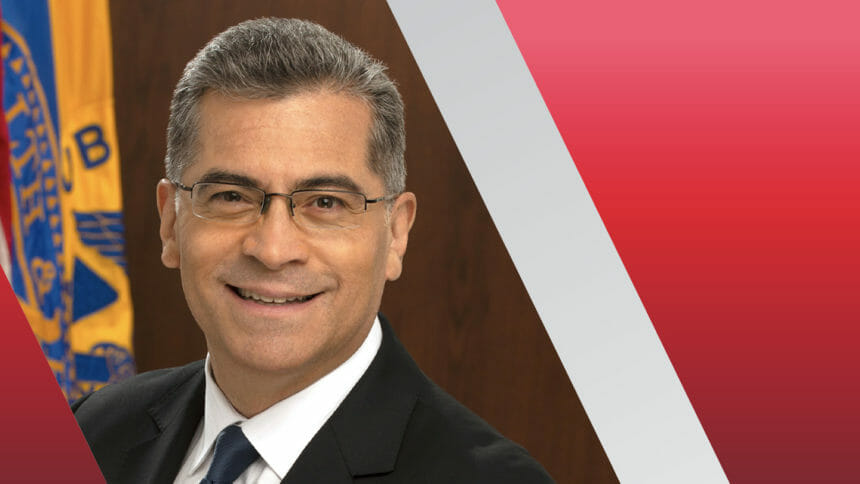
Health and Human Services Secretary Xavier Becerra this week took part in a national union event supporting the proposed nursing home staffing rule, giving the labor audience and their leaders credit for advancing the controversial measure.
“We are here because so many of you made the demand, quite honestly, the push to make sure that we establish real standards … that in the law … we have something that says we are going to provide quality, quality care for residents but also a quality environment for the folks who do the work,” Becerra said in a Facebook live event sponsored by the Service Employees International Union, or SEIU.
The union claims to be the largest serving healthcare workers in North America, representing more than 1.1 million members. It is heavily involved in the Kaiser Permanente strike, in which 75,000 workers are off the job for three days to protest staffing levels and wage negotiations in other healthcare settings.
But leaders took time out Wednesday to continue their assault on the nursing home sector, with Becerra a surprise guest during the hour-long event. Becerra praised President Biden’s advocacy for union workers, especially those in nursing homes, noting his administration is the first to attempt more stringent staffing regulations.
The proposed rule includes an outright nod to unions in its possible inclusion of union representatives in an enhanced facility assessment process, allowing labor to help dictate how many workers are needed at each site.
And Becerra urged workers to continue shaping the rule. The comment period remains open through Nov. 6.
“We need to hear from you because when we put out the final rule, we want to make sure it has incorporated all the voices of people who understand what it means to have quality nursing care for all of our residents and all the people that we love,” Becerra said on the SEIU event.
“No one living in a nursing home should experience bladder infections or bed sores because they didn’t get the kind of proper care that they should,” he added. “And by the way, no worker should feel stretched. … They’re stretched too thin, unable to provide the care they know they can provide that they’re trained to provide and that they’re committed to give to the residents in these facilities.”
Becerra acknowledged that some nursing homes “are doing fairly well” and offering high-quality care. But he said others continue to drop the ball because they’re understaffed.
“Our game plan at HHS is to ensure people are safe and getting top-tier care, period. We came up with these proposed standards after years of collecting and assessing data, receiving studies [and] the thousands of comments that we’ve already received and a lot of ears on the ground,” he said.
Becerra also touted the rule’s exemptions, arguing that they would give providers a way to deal with hiring hardships.
“And what we’re going to try to to do is make sure we’re there to help everyone get there. Some of these changes, they’re staggered over time,” he added. “We’re not making proposals in a vacuum. We’ve been talking with workers, with residents, with providers and experts. … We’re trying to understand what people are going through.”
The secretary also reiterated that his department will be launching a workforce staffing campaign to go alongside its proposed rules.
“We know we’ve got to help make sure we’ve got the trained, skilled and capable and enthusiastic workforce that it’s going to take,” he said. “So we’re going to invest some money, real money.”
In its Sept. 1 proposal, the Centers for Medicare & Medicaid Services proposed $75 million to support scholarships and other initiatives to build a stronger nursing pipeline in the US. The agency has estimated operators’ cost of complying with the rule at $4 billion annually.




